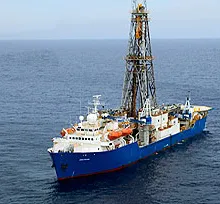
Scientists from the National Oceanography Centre in Southampton will be joining a North Atlantic deep-sea drilling expedition that aims to uncover the secrets of the world’s climate system during the last period of ‘extreme warmth’, which occurred over 30 million years ago.
The expedition will collect samples of ocean sediment from depths of up to 5,000 metres, from Newfoundland Ridges, 450 miles off the coast of Canada close to the wreck site of RMS Titanic.
Analysis of these sediments will provide one of the world’s most complete and undisturbed records of climate change, and help construct a detailed history of the workings of the world’s ocean currents and climate systems.
Professor Paul Wilson, of the University of Southampton’s programme in Ocean and Earth Science said, “The deep water of the North Atlantic is forced to flow over the Newfoundland Ridges, and two major current systems – the northward-flowing Gulf Stream and the southward-flowing Deep Western Boundary Current cross over the drilling area. The sediments they deposit leave a record of their flow strength, chemical composition and the life forms that were present at the time the sediment was deposited.”
The expedition drill ship JOIDES Resolution will drill the ocean bed to depths of up to 400 metres to provide samples from 11 sites in areas where the depth of mineral deposits are most likely to have been affected by previous greenhouse gas-fuelled global warming. As atmospheric levels of carbon dioxide rise, so does the ocean’s acidity leading to changes in the type of sediment deposited on the ocean floor.
The rate of sediment deposition is also affected by the strength of the current passing over the ocean floor and National Oceanography Centre scientists intend to use the expedition findings to gain a detailed history of the Deep Western Boundary Current, which runs from the Greenland Sea down the East Coast of North America to the tip of South America.
The Deep Western Boundary Current is thought to help drive the Gulf Stream, which feeds warm water from Florida into the North Atlantic, and across to Western Europe. The Gulf Stream has a profound influence on the climate in Europe, and is largely responsible for the temperate climate enjoyed in Britain today.
Paul Wilson continued “The drill cores from the expedition not only provide a highly resolved picture of what happens in the oceans when the Earth enters a period of greenhouse-gas fuelled warming, but will also help us understand the intricate relationship between climate change, ocean currents and the climate in high northern latitudes, including Britain.”